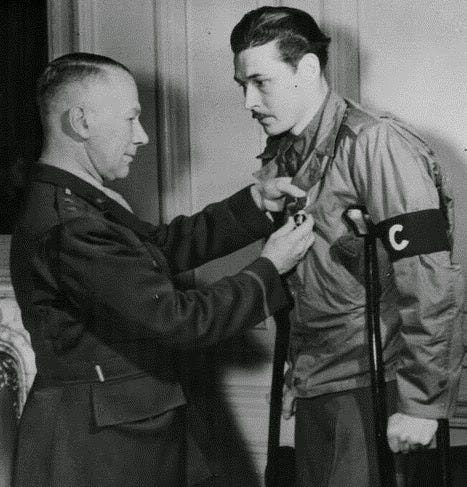Leo S. Disher, first correspondent to earn a Purple Heart
Operation Torch, the Allied invasion of Nazi-occupied North Africa, represented the first large-scale action for U.S. troops during the war.
Launched on Nov. 8, 1942, the operation also would end up establishing another first when Leo S. Disher of United Press became the first correspondent awarded the Purple Heart.
Disher, who was born Feb. 24, 1912 in Winston-Salem, North Carolina, was aboard a Coast Guard cutter that was assigned to ram a defensive boom in the harbor at Oran, Algeria. And he wasn't exactly battle-ready. Earlier during the voyage, Disher had fallen on the ward room deck in rough seas and broken his left ankle. When it came time for the operation to jump off, he was in a cast and using crutches.
In addition to the life preserver he wore in the conventional manner, Disher tied another one to his leg for extra buoyancy, just in case. That turned out to be a prescient decision.
As the cutter charged into the harbor, she inadvertently hit a Coast Guard motor launch as a French cruiser fired from point-blank range. The cutter eventually hit the cruiser, too, as the situation deteriorated.
"Things began blowing up around us," Disher wrote. "Our depth charges blew up. Steam broke loose to starboard. The smoke became dense and the cannon fire was now only a red haze.
"I crawled from the bridge to the deck and spotted a drifting boat alongside. Then I was struck by a shrapnel blast in both legs. It threw me back on the bridge. I realized that I was bleeding profusely. I pulled myself with my good leg to the side of the boat forward. The skipper was standing alone nearby. He called to me, mistaking me for an officer.
"A shell burst and knocked us both to the deck. Another shell burst. The deck was heaving under incessant explosions. Our heavy store of dynamite in the hold started to go up."
Disher described an increasingly ghastly scene as the cutter caught fire, with the French cruiser still firing on her from mere yards away. The correspondent eventually jumped overboard amid the inferno, but his life preservers did not work as intended. The one around his chest had been punctured by shrapnel and proved useless, while the one strapped to his leg stayed buoyant, leaving his head underwater.
He eventually was able to tear that one off and swim about 100 feet to a French merchant ship moored in the harbor as the sodden cast pulled him downward in the water. After a few moments to catch his breath, he swam for the pier and made it ashore. But just as a pair of soldiers helped pull him up, a bullet hit him in the left heel, leaving him to crawl along the stone for cover.
"I got behind some logs but a shell set fire to them. I crawled to another pile, 75 yards away, and reached a walled street to find guns firing through it from both ends. A spent bullet hit me in the temple. I could not go any farther and I just lay there.
"I was in the street for an hour and a half before a French patrol picked me up. They took me to an underground air raid post where the battered, bloody survivors were coming in. They carried me out in the rain on a stretcher as dawn broke. I saw our ship aflame 300 feet away, shaking with explosions."
As he lay on a stretcher on a hospital floor, a shell shattered the window beside him. All told, Disher ended up with nine shrapnel or bullet wounds. For the next 40 hours, as he lay in the hospital, the battle raged on.
Finally, "the firing stopped and American soldiers marched into the hospital. It was one of the greatest joys of my life."
Disher's harrowing account written from his bed at the Hôpital Baudens would appear in U.S. newspapers 10 days later.
The correspondent would continue his work after recuperating from his many wounds, covering the Normandy invasion and following Patton's Third Army across Europe.
He died of cancer in 1969 at age 57.




